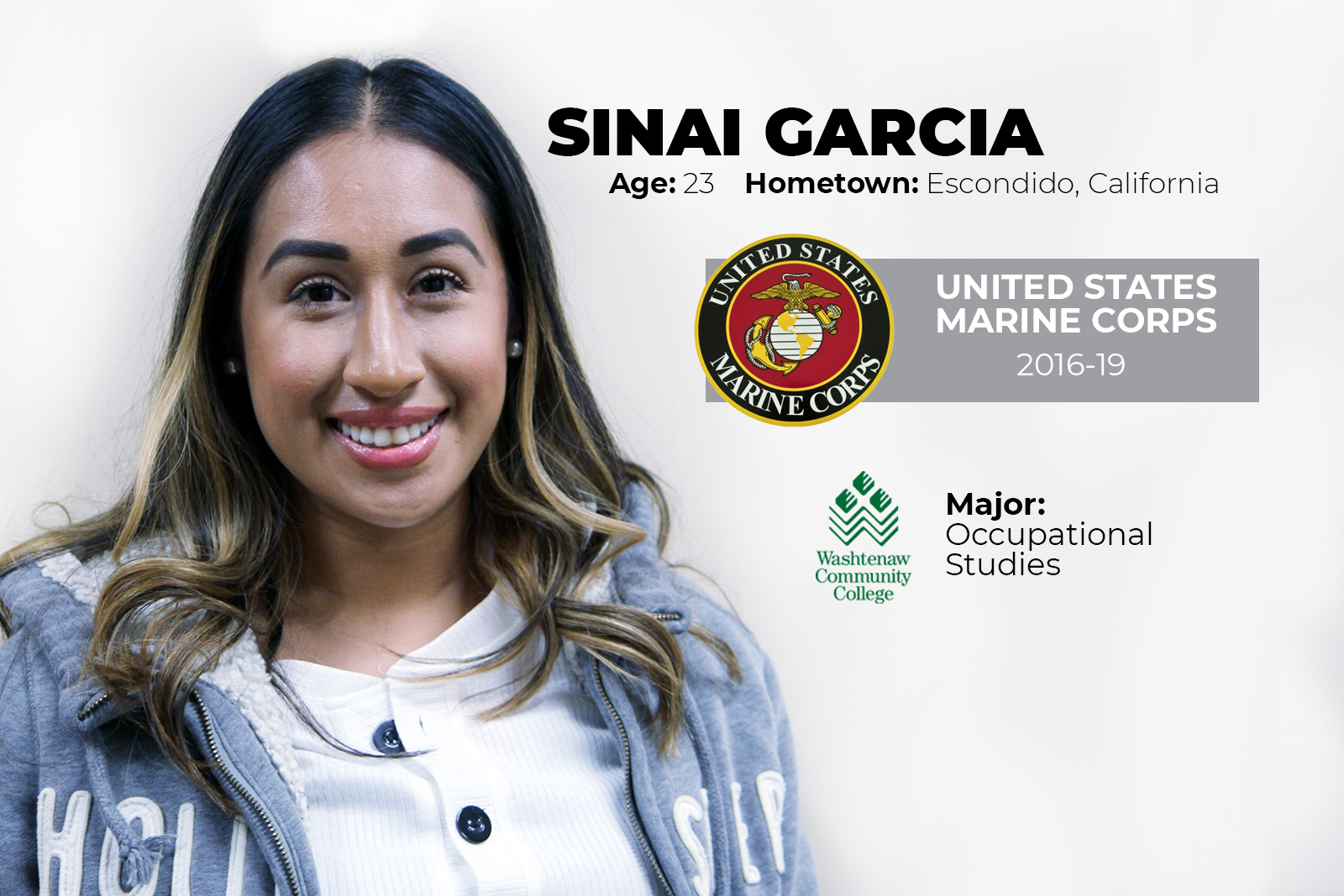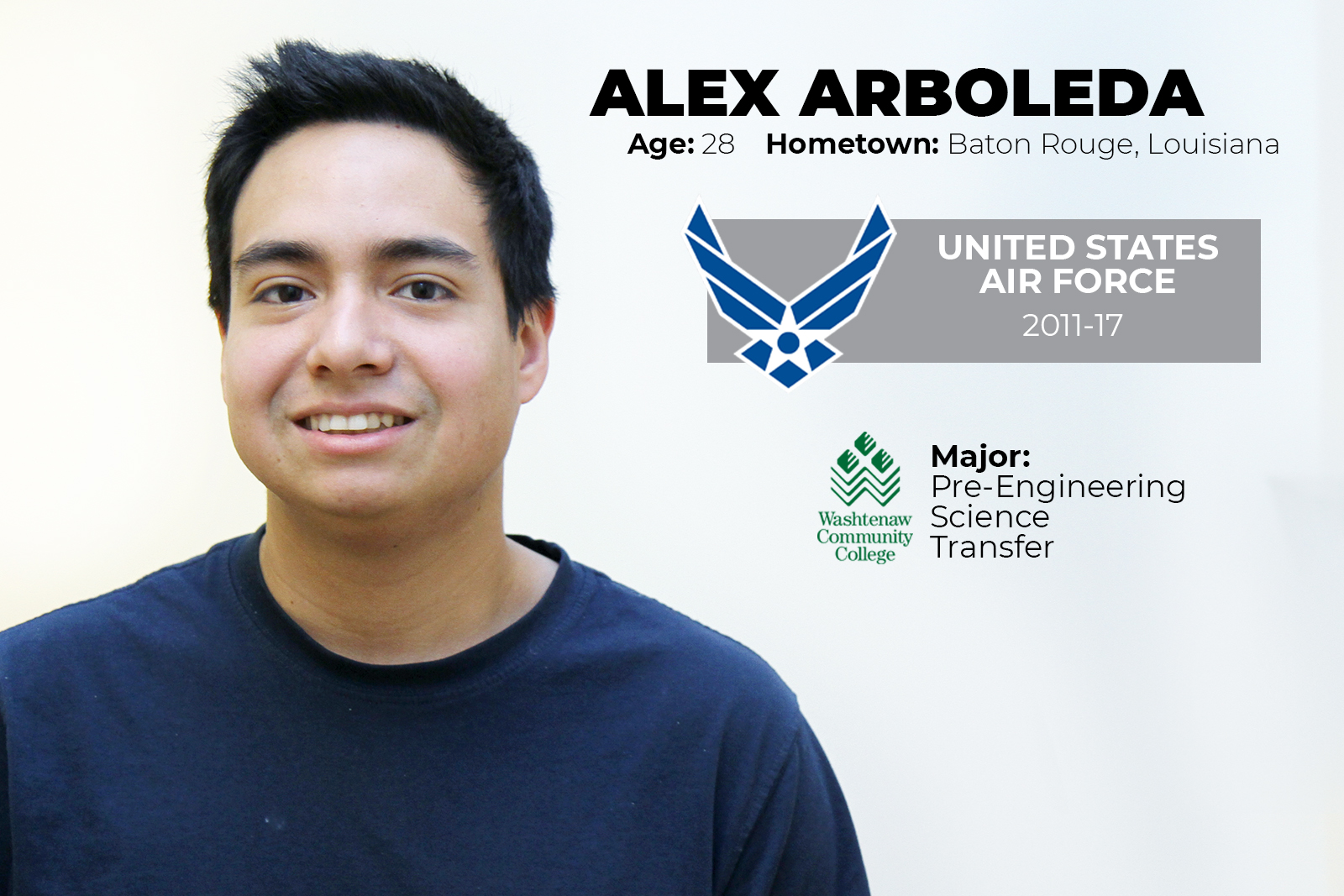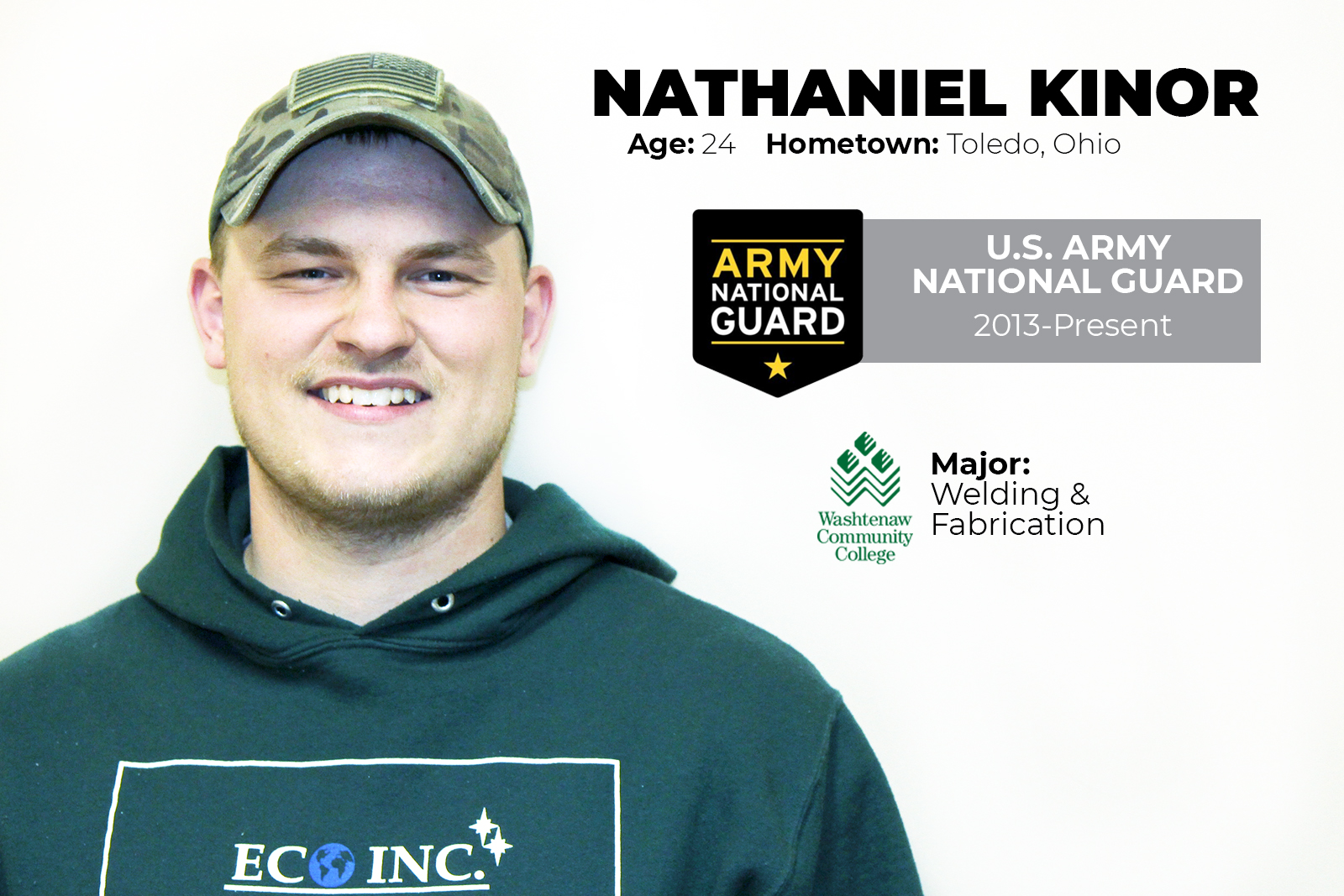Veterans Day at Washtenaw Community College started with a sunrise flag-raising ceremony and included several events to honor all who served, particularly the more than 600 student veterans who enroll at Washtenaw Community College each year.
Jessica Medina and Alex Arboleda, president and vice president of the WCC chapter of Student Veterans of America (SVA) respectively, each spoke at a mid-day reception.
Medina, who served in the United States Marine Corps from 2012 to 2017, spoke of the importance of groups like SVA and the services offered by the WCC Wadhams Veterans Center as being important to help student veterans transition back to “normal” life.
“It’s incredibly lonely when transitioning out of the military. Essentially, overnight, our entire world changes,” she said. “We leave behind friends and the barracks we called home for the last few years. Everything changes: The clothes we wear every day, our responsibilities and even the way people address us. It’s difficult relating to your peers when it feels like we’re from two completely different worlds.
“For these reasons it is common to feel out of place in a college environment. Especially because we are older than traditional college students. However, running into other veterans around campus is a great reminder that we aren’t alone.
“Thankfully, WCC understands the importance of this and has given us the Wadhams Veterans Center, a a place where we can gather and meet other people with military backgrounds. Although it may just look like a normal room, it’s a haven to many of us. Within those walls, veterans feel free to be themselves.”
Arboleda talked about how important diversity is to the WCC campus, where students from a mixture of states, regions and nations bring their own perspectives. And how student veterans are a piece of that diversity.
“WCC thrives by facilitating the showcasing of their creativity and ideals in a safe, public forum,” said Arboleda, a native of Baton Rouge, Louisiana who served in the United States Air Force from 2011 to 2017. “With this in mind, veterans belong to a certain community within our student body and add a different perspective to the WCC experience. Some of us may have a rugged exterior in terms of personality, but if you take the time to get to know us, you may find that we aren’t different from the usual student.”
Veteran Profiles
As part of its Veterans Day celebration, WCC profiled Medina, Arboleda and 10 other student veterans:

Q: What are your plans after WCC?
MEDINA: Transfer to the University of Michigan and eventually work in the robotics field.
Q: Why did you choose to serve our country?
MEDINA: “I grew up very poor, so I felt like I should give back for all the help we got when I was a kid.”
Q: What part of your service impacted you the most?
MEDINA: “When I was pinned to the rank of Sergeant by my cousin, which was a really nice experience.”
Q: What’s something non-veterans might not know, but they should?
MEDINA: “I would say that we’re not unfriendly. That’s just kind of how we look.”
Q: What does Veterans Day mean to you?
MEDINA: “It’s a day to reminisce about the friends I met in active duty – you don’t find those kind of friends anywhere else – and the veteran friends that I made outside the military, as well.”
NOTE: Medina is President of the WCC chapter of Student Veterans of America.
—-

Q: What are your plans after WCC?
COLTON: Transfer to the University of Michigan and study civil engineering.
Q: Why did you choose to serve our country?
COLTON: “I didn’t know what I wanted to do after high school, so Sept. 11 was probably my deciding factor.”
Q: What part of your service impacted you the most?
COLTON: “Graduating from Explosive Ordnance Disposal School.”
Q: What’s something non-veterans might not know, but they should?
COLTON: “That most veterans are pretty approachable … we just have different experiences than you. And we don’t think there’s any shame in you not joining the military.”
Q: What does Veterans Day mean to you?
COLTON: “Being thankful for all people who defend our freedom.”

Q: What are your plans after WCC?
CONNELLY: Study engineering at the University of Michigan with the goal of working in the aviation industry designing electrical components for airplanes or spacecraft.
Q: Why did you choose to serve our country?
CONNELLY: “I needed something to change my outlook on life and where I was going with it.”
Q: What part of your service impacted you the most?
CONNELLY: “When I got the Eagle, Globe and Anchor – the symbolism for becoming a Marine, after bootcamp. Your life changes at that moment.”
Q: What’s something non-veterans might not know, but they should?
CONNELLY: “Some of us might seem intimidating, but in reality we’re just like everyone else. We just experienced something a little more intense than the average person has experienced.”
Q: What does Veterans Day mean to you?
CONNELLY: “It’s a reminder, for all those who need it, that they were in the military at one point in their life and that they made a difference.”

Q: What are your plans after WCC?
PRICE: Transfer to a four-year university to study business.
Q: Why did you choose to serve our country?
PRICE: “The educational opportunities.”
Q: What part of your service impacted you the most?
PRICE: “Serving in Korea for three years and being a part of real-world operations directly impacting our presence in North Korea and the South China Sea.”
Q: What’s something non-veterans might not know, but they should?
PRICE: “(The military) is the best environment for learning life lessons. You learn things others can’t teach.”
Q: What does Veterans Day mean to you?
PRICE: “I think it’s an homage not only to veterans but also to their families. It shows the sacrifice by many, not just the few. It impacts anybody who knows anybody who served. It’s for everyone.”

Q: What are your plans after WCC?
SWEET: Follow an entrepreneurial path, perhaps by opening a bakery. With the last name Sweet, it kind of markets itself.
Q: Why did you choose to serve our country?
SWEET: “Part of it was family tradition. My grandfather and a couple cousins were in the Navy. Also because I grew up lower-middle class and was in need of funds for college.”
Q: What part of your service impacted you the most?
SWEET: “Surviving a three-day typhoon between Guam and Thailand, with 30-foot rollers coming over the bow of our ship. Making it through that storm, coming out on the other side … I realized that if I can do that, there’s so much more that I can do.”
Q: What’s something non-veterans might not know, but they should?
SWEET: “Every veteran serves their own service and not every veteran is a war veteran.”

Q: What are your plans after WCC?
GARCIA: Hopes to transfer to Michigan State University, but is unsure of major. Wants to pursue a career in “something that helps people.”
Q: Why did you choose to serve our country?
GARCIA: “I wanted to get out and explore. I didn’t want to be stuck in my town.”
Q: What part of your service impacted you the most?
GARCIA: “When I started to pick up rank and my Marines were depending on me, looking up to me. I had to actually set a good example.”
Q: What’s something non-veterans might not know, but they should?
GARCIA: “We’re nice people, we’re caring. Especially female Marines have strong stereotypes that aren’t true.”
What does Veterans Day mean to you?
GARCIA: “It’s a nice thing when people acknowledge the military. I feel like they should acknowledge it every day.”

Q: What are your plans after WCC?
ARBOLEDA: Has been accepted to the University of Michigan, where he will begin studying chemical engineering in the winter semester.
Q: Why did you choose to serve our country?
ARBOLEDA: “Educational and travel opportunities.”
Q: What part of your service impacted you the most?
ARBOLEDA: “Just seeing all the different people that join … some that do well, others fall through the cracks. I’m lucky enough that I had people that set me on the right path and showed me that education was the way to go.”
Q: What’s something non-veterans might not know, but they should?
ARBOLEDA: “That we are normal people. Some may have rugged exteriors in terms of character, but if you’re able to see through that, you’ll find a pretty normal, Average Joe.”
Q. What does Veterans Day mean to you?
ARBOLEDA: “Thankfulness for the people that came before me and did the hard work and sacrifice. They paved the way for us to have all these benefits — health care, mental health advisors and an education bill. Thanks.”

Q: What are your plans after WCC?
FLETCHER: To work as an elevator mechanic, beginning with an apprenticeship with Elevator Constructors Union, Local 36 out of Detroit.
Q: Why did you choose to serve our country?
FLETCHER: “I wanted to protect my country.”
Q: What part of your service impacted you the most?
FLETCHER: “My deployment to Yemen.”
Q: What does Veterans Day mean to you?
FLETCHER: “It’s a day to honor and show respect to those who have served previously, or are still serving.”
—-

Q: What are your plans after WCC?
KINOR: Become a welding inspector.
Q: Why did you choose to serve our country?
KINOR: “I joined the National Guard because it gives me an opportunity to serve my country while also doing things on the civilian side of life.”
Q: What part of your service impacted you the most?
KINOR: “While I was deployed to Jordan, I really rethought my life. I was studying to go into natural resource law enforcement, but I decided to quit that and go into the trades.”
Q: What’s something non-veterans might not know, but they should?
KINOR: “How much a commitment to service complicates your regular life.”
Q: What does Veterans Day mean to you?
KINOR: “It’s a sign of respect to veterans so they can celebrate what they’ve contributed.”

Q: What are your plans after WCC?
LENHART: Pursue a bachelor’s degree and a master’s degree at Eastern Michigan University and work in the social work field.
Q: Why did you choose to serve our country?
LENHART: “It’s sort of a family tradition, and I really was not ready for anything else. I needed a little more discipline. I got that.”
Q: What part of your service impacted you the most?
KINOR: “My first deployment to Fallujah, Iraq.”
Q: What’s something non-veterans might not know, but they should?
LENHART: “That the discipline you find in the military definitely transitions and is beneficial in regular life.”

Q: What are your plans after WCC?
MATTEIS: Attend Eastern Michigan University to continue studying cybersecurity and work as a penetration tester.
Q: Why did you choose to serve our country?
MATTEIS: “A lot of my family was in the military. We couldn’t afford to go to college, so I knew it would help me earn money for school and help me reach a career.”
Q: What part of your service impacted you the most?
MATTEIS: “I was working as a medic and had to transport a staff sergeant who developed schizophrenia six hours from our base in England. That one-on-one with her definitely taught me that I could handle a situation like that, but also taught me something about people suffering from mental health problems.”
Q: What’s something non-veterans might not know, but they should?
MATTEIS: “People hear what’s going on in the news, all these things happening, and they have an opinion; but you don’t really understand what’s going on until you experience those things in real life. Things are different when you’re put in situations. There’s lots more to this world than they would know.”
Q: What does Veterans Day mean to you?
MATTEIS: “People acknowledging our service. It makes me feel appreciated, because we don’t hear it very often.”

Q: What are your plans after WCC?
SHELDON: Hopes to transfer to the University of Michigan to continue studying computer science and pursue a career as a software engineer.
Q: Why did you choose to serve our country?
SHELDON: “A lot of reasons. The main one was because a lot of my family members went in, so it was my time.”
Q: What part of your service impacted you the most?
SHELDON: “I spent my last couple months supporting people during the hurricane disaster (while stationed at Camp Lejeune in North Carolina). Seeing that progress was impactful.”
Q: What’s something non-veterans might not know, but they should?
SHELDON: “For the new generation, I think they would learn in the military to respect everyone. I think there are a lot of kids who would be humbled if they went over and saw what I saw.”
What does Veterans Day mean to you?
SHELDON: “It means remembering the people who sacrificed and did what they had to do not only to keep our freedoms, but to prolong our freedoms.”
Learn more about services offered by WCC’s Wadhams Veterans Center >> vetcenter.wccnet.edu
Tags: December 2019, On The Record, Student Veterans, Veterans, Wadhams Veterans Center, ousearch_News_On The Record
